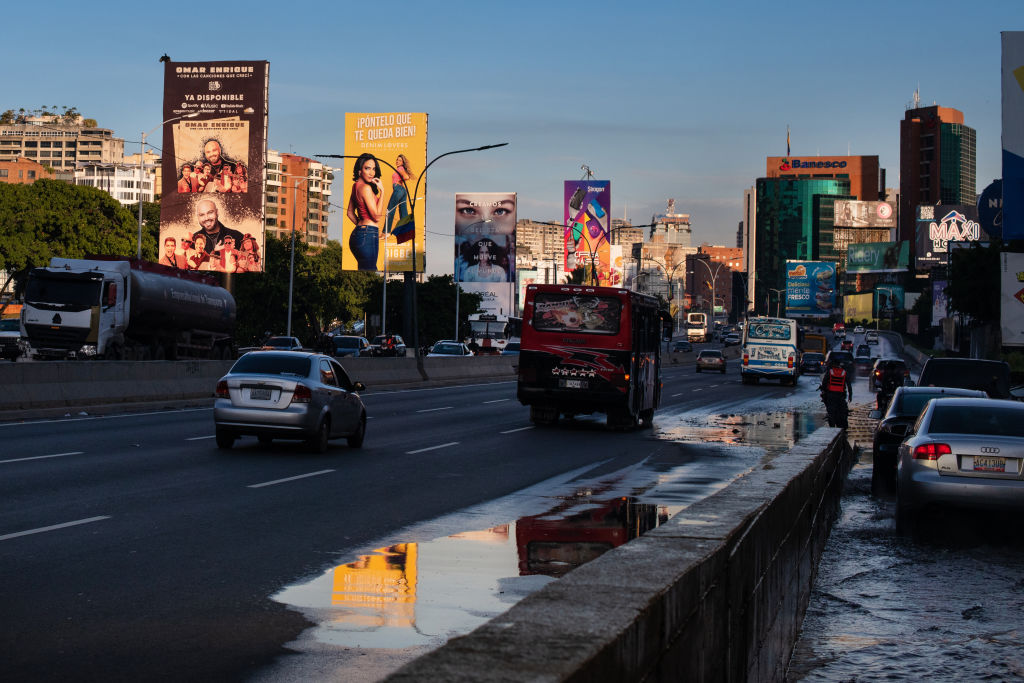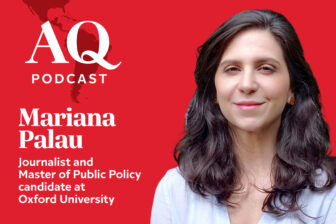For Venezuelans, the year 2019 felt like it lasted a century. The economy was cratering, and the country had just endured two especially dismal years that drove mass migration. A political crisis tore Venezuela between Juan Guaidó—recognized as president by over 50 countries, yet powerless on the ground—and Nicolás Maduro, who broke election laws and violated the constitution to cling to power. A calamitous nationwide blackout dragged on for days, and it is still felt even today in the many cities that remain without continuous electricity.
Now, the government is touting a narrative of economic recovery. GDP growth projections for 2022 range from 3% to 20%—though the economy has shrunk almost 80% since 2013, so any growth is relative to what little remained in the wake of that contraction. Meanwhile, Venezuela exited four years of hyperinflation earlier this year, but the annual inflation rate this summer remained around 170%, one of the highest rates in the world, according to the Venezuelan Finance Observatory.
Still, on the ground, people are more likely to celebrate the recent return of basic goods and services than to contrast it with how things were 10 years ago. And internationally, even slight improvement seems to generate positive headlines. This optimism forgets that the government achieved its apparent recovery not with meaningful reforms or policy changes, but through sudden, informal deregulation, which now leaves the economy vulnerable.
In 2019, on top of everything else, the government all but disappeared. It stopped applying price and foreign currency controls and allowed the dollar to circulate freely. Tax and customs authorities stopped collecting—no tariffs, no income tax, no VAT—and labor law enforcement vanished.
With the purchasing power of the bolívar squandered, a small influx of cash dollars roaming free in the country distributed oxygen to small sectors of the economy. Imported products that had disappeared re-emerged in the market, as did some local brands that many believed were extinct.
In 2020, the government reappeared to claim credit for the unofficial economic reform. Even as the global pandemic crept in, the private sector took over many public utilities, targeting consumers who could afford them. New businesses began to sprout in big cities, offering everything from internet services, education, restaurants, entertainment and food imports (the infamous bodegones) to electronic payment and delivery services.
New sources of income allowed the government to double down on its quiet quest to reduce its deficit. But again, not formally. It simply continued to cut public spending by starving public employees with the lowest salaries in the region. This precipitated the most effective protest movement in years, led by public education workers who have taken to the streets over “hunger salaries.”
This approach of “unofficial economic reform” didn’t feel sustainable, but after three years it has seeped into every industry. It remains informal and weak, based more on handshakes and laissez-faire than laws or policies, but it has managed to plow through the classic chavista model of economic control and private sector exclusion.
Key to this strategy is the Anti-Blockade Law, designed to lure in foreign investment and circumvent sanctions. It was passed by the Constituent Assembly, which was formed ostensibly to write a new constitution but in reality served as a parallel parliament when the National Assembly was held by the opposition.
In essence, the law is a marketing device that promises confidentiality and favorable business conditions, including backroom meetings for prospective partners and investors with powerbrokers like Vice President Delcy Rodríguez and Oil Minister Tareck El Aissami, according to people who have attended such meetings. But the law falls well short of the kind of broad hydrocarbons reform that Venezuela’s foreign allies, mainly China and Russia, have insisted upon. They want what everyone in the Venezuelan oil business wants: less involvement from state oil firm PDVSA and more stake in their projects. Chevron, one of PDVSA’s U.S. partners, has apparently joined this chorus.
Maduro’s parallel parliament couldn’t pass that reform for the same reason that the new National Assembly, allied with Maduro, cannot: Chavista ideologues and certain old-guard powerbrokers are not yet willing to allow the privatization of Venezuela’s key industries. So, for now, the old legal framework remains in effect, albeit with the loopholes afforded by the Anti-Blockade Law.
The government is attempting to use those loopholes to revamp oil production by building strategic alliances and attracting new investors. It has little to lose; most of the assets and facilities being privatized are in shambles. For private investors, it’s a high-risk gambit given Venezuela’s track record of expropriations, but it’s also an opportunity to get a foot in the door of the oil sector at yard-sale prices.
In this unique moment, Maduro appears to be succeeding in his efforts to use the leverage provided by Russia’s invasion of Ukraine. Even as Venezuela is deepening its cooperation with Iran, it is negotiating with U.S. companies and revamping its relationships with European joint venture partners.
Maduro is quite comfortable in his exercise of power, and his administration is no longer trying to convince the world that it runs a legitimate democracy. Instead, it is pushing a narrative of economic recovery and working to turn Caracas into a model city of madurismo, a sort of economic Casablanca where all kinds of players operate and interact with each other.
There are high-risk investors and local tech entrepreneurs raising capital, small business owners and traditional companies, government allies and money launderers. The city is now replete with private sector ads where government propaganda used to hang. The offer of goods and services is already surpassing local demand, and shiny new buildings will likely remain empty. But this small blip of a recovery has sufficed to change the international narrative; commentators who once focused on the humanitarian crisis now tend to speculate that the economic picture in Venezuela may be getting better.
But the lack of a solid legal framework exacerbates the government’s inability to push forward key initiatives, like a coherent monetary policy. Meanwhile, the government’s erratic behavior remains a threat, driving it, for example, to double down recently on regressive policies such as the burdensome tax on large transactions in foreign currency.
Still, somehow, through its ad hoc reforms, the government proved it can survive crisis after crisis, even in the wake of the U.S. decision to place direct sanctions on PDVSA in 2019.
Now, the government could capitalize on its survival if it manages to formalize its reforms. What may result if madurismo provides reasonable assurances for international partners and investors? Whether we find out likely depends more on government party politics than negotiations with the opposition or international parties.
—
Stolk is the director of the Caracas Chronicles news outlet






